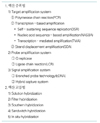Abstract
The genetic test is a powerful diagnostic tool targeting DNA and RNA, now widely used not only in diagnosis of cancers, infectious disease, genetic disease, but also ABO genotyping, HLA typing, and forensic medicine. Even though a genetic test is of an important diagnostic value, the technical difficulty and expense make it difficult for it to completely replace the standard tests. As it is a test of high sensitivity, there is a possibility of misjudgment by errors in sample. Supplementary tests such as morphology analysis or tissue pathology may be helpful in such cases. The automation of molecular-genetic diagnostic methods such as PCR, DNA sequencing, and DNA chip will help genetic tests highlighted in laboratories in the near future.
References
2. Unger ER, Piper MA. Henry JB, editor. Molecular diagnosis : basic principles and techniques. Clinical diagnosis and management by laboratory methods. 2001. 20th ed. Philadelphia: WB Saunders;1275–1280.
3. Cormican MG, Pfaller MA. Henry JB, editor. Molecular pathology of infectious diseases. Clinical diagnosis and management by laboratory methods. 2001. 20th ed. Philadelphia: WB Saunders;1241–1253.
4. Viswanatha DS, Larson RS. Henry JB, editor. Molecular techniques in the diagnosis of hematopoietic neoplasms. Clinical diagnosis and management by laboratory methods. 2001. 20th ed. Philadelphia: WB Saunders;1355–1371.
5. Morgan GJ, Pratt G. Modern molecular diagnostics and the management of hematological malignancies. Clin Lab Haematol. 1998. 20:135–141.

6. Grody WW, Noll WW. Henry JB, editor. Molecular diagnosis of genetic diseases. Clinical diagnosis and management by laboratory methods. 2001. 20th ed. Philadelphia: WB Saunders;1372–1389.

7. Beaudet AL, Scriver CR, et al. Scriver CR, Beaudet AL, editors. Genetics, biochemistry, and molecular basis of variant human phenotypes. The metabolic and molecular bases of inherited disease. 1995. 7th ed. New York: McGraw-Hill;53–117.




 PDF
PDF ePub
ePub Citation
Citation Print
Print






 XML Download
XML Download